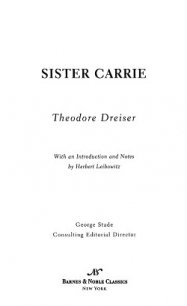Jennie Gerhardt - Драйзер Теодор (книги без регистрации бесплатно полностью сокращений .txt) 📗
"Why, nothing," answered Mrs. Gerhardt, in the same language. She was decidedly taken aback at his question. "He did call two or three times."
"You didn't tell me that," he returned, a sense of her frailty in tolerating and shielding such weakness in one of their children irritating him.
"No," she replied, absolutely nonplussed. "He has only been here two or three times."
"Two or three times," exclaimed Gerhardt, the German tendency to talk loud coming upon him. "Two or three times! The whole neighbourhood
talks about it. What is this, then?"
"He only called two or three times," Mrs. Gerhardt repeated weakly.
"Weaver comes to me on the street," continued Gerhardt, "and tells me that my neighbours are talking of the man my daughter is going with. I
didn't know anything about it. There I stood. I didn't know what to say.
What kind of a way is that? What must the man think of me?"
"There is nothing the matter," declared the mother, using an effective German idiom. "Jennie has gone walking with him once or twice. He has called here at the house. What is there now in that for the people to talk about? Can't the girl have any pleasure at all?"
"But he is an old man," returned Gerhardt, voicing the words of Weaver.
"He is a public citizen. What should he want to call on a girl like Jennie for?"
"I don't know," said Mrs. Gerhardt, defensively. "He comes here to the house. I don't know anything but good about the man. Can I tell him not
to come?"
Gerhardt paused at this. All that he knew of the Senator was excellent.
What was there now that was so terrible about it?
"The neighbours are so ready to talk. They haven't got anything else to talk about now, so they talk about Jennie. You know whether she is a
good girl or not. Why should they say such things?" and tears came into the soft little mother's eyes.
"That is all right," grumbled Gerhardt, "but he ought not to want to come around and take a girl of her age out walking. It looks bad, even if he
don't mean any harm."
At this moment Jennie came in. She had heard the talking in the front
bedroom, where she slept with one of the children, but had not suspected
its import. Now her mother turned her back and bent over the table where
she was making biscuit, in order that her daughter might not see her red
eyes.
"What's the matter?" she inquired, vaguely troubled by the tense stillness in the attitude of both her parents.
"Nothing," said Gerhardt firmly.
Mrs. Gerhardt made no sign, but her very immobility told something.
Jennie went over to her and quickly discovered that she had been
weeping.
"What's the matter?" she repeated wonderingly, gazing at her father.
Gerhardt only stood there, his daughter's innocence dominating his terror of evil.
"What's the matter?" she urged softly of her mother.
"Oh, it's the neighbours," returned the mother brokenly. "They're always ready to talk about something they don't know anything about."
"Is it me again?" inquired Jennie, her face flushing faintly.
"You see," observed Gerhardt, apparently addressing the world in general,
"she knows. Now, why didn't you tell me that he was coming here? The neighbours talk, and I hear nothing about it until to-day. What kind of a way is that, anyhow?"
"Oh," exclaimed Jennie, out of the purest sympathy for her mother, "what difference does it make?"
"What difference?" cried Gerhardt, still talking in German, although Jennie answered in English. "Is it no difference that men stop me on the street and speak of it? You should be ashamed of yourself to say that. I
always thought well of this man, but now, since you don't tell me about
him, and the neighbours talk, I don't know what to think. Must I get my
knowledge of what is going on in my own home from my neighbours?"
Mother and daughter paused. Jennie had already begun to think that their
error was serious.
"I didn't keep anything from you because it was evil," she said. "Why, he only took me out riding once."
"Yes, but you didn't tell me that," answered her father.
"You know you don't like me to go out after dark," replied Jennie. "That's why I didn't. There wasn't anything else to hide about it."
"He shouldn't want you to go out after dark with him," observed Gerhardt, always mindful of the world outside. "What can he want with you. Why does he come here? He is too old, anyhow. I don't think you
ought to have anything to do with him—such a young girl as you are."
"He doesn't want to do anything except help me," murmured Jennie. "He wants to marry me."
"Marry you? Ha! Why doesn't he tell me that!" exclaimed Gerhardt. "I shall look into this. I won't have him running around with my daughter,
and the neighbours talking. Besides, he is too old. I shall tell him that. He ought to know better than to put a girl where she gets talked about. It is better he should stay away altogether."
This threat of Gerhardt's, that he would tell Brander to stay away, seemed simply terrible to Jennie and to her mother. What good could come of any
such attitude? Why must they be degraded before him? Of course Brander
did call again, while Gerhardt was away at work, and they trembled lest
the father should hear of it. A few days later the Senator came and took
Jennie for a long walk. Neither she nor her mother said anything to
Gerhardt. But he was not to be put off the scent for long.
"Has Jennie been out again with that man?" he inquired of Mrs. Gerhardt the next evening.
"He was here last night," returned the mother, evasively.
"Did she tell him he shouldn't come any more?"
"I don't know. I don't think so."
"Well, now, I will see for myself once whether this thing will be stopped or not," said the determined father. "I shall talk with him. Wait till he comes again."
In accordance with this, he took occasion to come up from his factory on
three different evenings, each time carefully surveying the house, in order to discover whether any visitor was being entertained. On the fourth
evening Brander came, and inquiring for Jennie, who was exceedingly
nervous, he took her out for a walk. She was afraid of her father, lest
some unseemly things should happen, but did not know exactly what to
do.
Gerhardt, who was on his way to the house at the time, observed her
departure. That was enough for him. Walking deliberately in upon his
wife, he said:
"Where is Jennie?"
"She is out somewhere," said her mother.
"Yes, I know where," said Gerhardt. "I saw her. Now wait till she comes home. I will tell him."
He sat down calmly, reading a German paper and keeping an eye upon his
wife, until, at last, the gate clicked, and the front door opened. Then he got up.
"Where have you been?" he exclaimed in German.
Brander, who had not suspected that any trouble of this character was
pending, felt irritated and uncomfortable. Jennie was covered with
confusion. Her mother was suffering an agony of torment in the kitchen.
"Why, I have been out for a walk," she answered confusedly.
"Didn't I tell you not to go out any more after dark?" said Gerhardt, utterly ignoring Brander.




